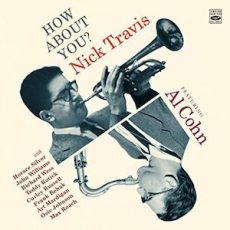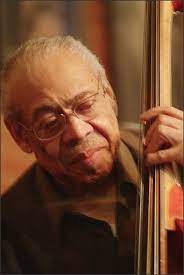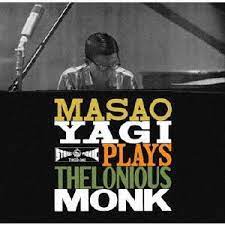
Daily Dose Of Jazz…
Nick Travis was born on November 16, 1925 in Philadelphia, Pennsylvania and started playing professionally at age 15. In the early Forties he played with Johnny McGhee, Vido Musso, Mitchell Ayres, and Woody Herman.
In 1944 he enlisted, however, after his service he played with Ray McKinley, Benny Goodman, Gene Krupa, Ina Ray Hutton, Tommy Dorsey, and Tex Beneke. By the 1950s he was playing with Herman once more for a short stint, Jerry Gray, Bob Chester, Elliot Lawrence, and Jimmy Dorsey. From 1953-56 he played with Gerry Mulligan, Zoot Sims, Al Cohn, with whom he featured on the one session he led for Victor Records, and was a soloist in the Sauter-Finegan Orchestra.
After this he became a session musician for NBC, Most of his work was in big bands, but he also played in small ensembles. Trumpeter Nick Travis transitioned at age 38 as a result of complications from ulcers on Oct. 7, 1964 in New York City.
More Posts: bandleader,history,instrumental,jazz,music,trumpet

Three Wishes
Buddy Catlett was able to succinctly sum up his wishes with one answer when Pannonica asked him what his three wishes would be:
- “I don’t know if I can word it right… To try and complete myself as a human being! That’s about it. That takes care of all three of them.”
More Posts: baroness,bass,history,instrumental,jazz,music,pannonica,three,wishes

Daily Dose Of Jazz…
Curtis Sylvester Lowe, Sr. was born on November 15, 1919 in Chicago, Illinois and raised in Oakland, California. He first learned to play soprano saxophone as a youth and studied briefly in Alabama before deciding to take up music full-time. Best known professionally as a tenor and baritone saxophonist, he played in traveling bands before the outbreak of World War II. Enlisting in the United States Navy in 1942, his unit band was full of noteworthy jazz musicians, including Vernon Alley, Wilbert Baranco, Buddy Collette, Jerome Richardson, Ernie Royal, and Marshall Royal.
In the 1950s Curtis worked extensively with Lionel Hampton and also played with Dave Brubeck, Little Esther, Johnny Otis, and Gerald Wilson. He led his own five-piece ensemble in 1952-1953. In 1958 he began a decade-long association with Earl Hines.
He was active locally in San Francisco, California and the Bay Area into the 1980s. Saxophonist Curtis Lowe Sr., who never recorded as a leader, transitioned at the age of 73 on October 29, 1993.
More Posts: bandleader,history,instrumental,jazz,music,saxophone

Daily Dose Of Jazz…
Masao Yagi was born on November 14, 1932 in Tokyo, Japan. He became devoted to American jazz very early in the wave of Japanese jazz enthusiasm, becoming a member of the Cozy Quartet in 1956 after Toshiko Akiyoshi’s departure. During his tenure in the quartet he played alongside Sadao Watanabe.
In 1959, at twenty-six, the pianist formed his own group featuring several Thelonious Monk tunes in their repertoire, culminating in his debut album, Masao Yagi Plays Thelonious Monk, recorded in the summer of 1960. Later in the decade he played with Charlie Mariano, Hidehiko Matsumoto, and Helen Merrill.
The 1970s saw Yagi leading his own ensembles. He was well-known as a composer and arranger, and wrote copiously for film soundtracks.
Pianist Masao Yagi transitioned on March 4, 1991.
More Posts: bandleader,history,instrumental,jazz,music,piano

Requisites
Perdido ~ The JATP All-Stars | By Eddie Carter
This morning’s column features some of the best musicians in jazz. Jazz At The Philharmonic was a series of concerts organized by Norman Granz. From 1944 to 1949, this revolving ensemble of all-stars made one of the greatest impacts on the public since the heyday of Swing. Perdido (VSP-Verve VSP-16/VSPS-16) is a 1966 reissue highlighting two performances by The JATP All-Stars from September 27, 1947. The song debuted on Norman Granz’s Jazz At The Philharmonic, Volume Eight. The personnel is Howard McGhee on trumpet, Bill Harris on trombone, Illinois Jacquet, Flip Phillips on tenor sax, Hank Jones on piano, Ray Brown on bass, and Jo Jones on drums. My copy used in this report is the 1966 US Mono reissue.
Side One gets underway with Perdido, a jazz standard written by Juan Tizol in 1941. Ervin Drake and Hans Lengsfelder added lyrics three years later. In Spanish, Perdido means lost and the song refers to the street in New Orleans. The rhythm section introduces the tune, segueing into the ensemble’s mid-tempo melody. Flip opens the solos at a deceptively relaxed groove, before elevating to a joyous swing that captures the enthusiasm of the crowd. Howard adds drive and excitement to the second reading. Illinois energizes the third statement with an invigorating power supply. Next, Hank has a good deal to say, then Bill captivates the audience in the closing statement with a mix of poise and fire ahead of the ensemble’s finish.
Side Two opens with Mordido, a jaunty tune occupying the second side. The composer is listed as Norman Shrdlu but is Norman Granz. Everyone gets an opportunity to solo, and the song gets underway with the septet’s collective melody. Illinois is up first with jubilant shouts of joy in the opening statement. Howard takes over and romps through the second solo with great passion. Hank takes the reins next and cooks with conviction. Bill follows and has an exceptionally brisk conversation with the rhythm section. Ray takes his bass for a very spirited walk, then Flip provides a scintillating statement of concentrated heat. Jo fuels the finale with energetic brushwork leading to the closing chorus and appreciative applause from the crowd.
Val Valentin engineered the concert’s original recording, and the remastering was done by Dave Greene. The sound quality of this reissue is a little bright with no distortion during the highs, midrange, and low end. However, there’s a little noise during the first few moments of the opening track. Norman Granz was one of the most successful jazz promoters and produced Jazz At The Philharmonic concerts in the US, Canada, Europe, and Japan from 1944 to 1983. He also founded five record labels, Clef, Down Home, Norgran, Pablo, and Verve. The roster of musicians and vocalists he toured with is the definitive Who’s Who in Jazz. Granz also fought for equal rights for the black musicians who worked for him, paying them the same wage as white musicians, and providing the same lodging as well.
I chose Perdido for this week’s discussion to honor one of my favorite tenor saxophonists, Illinois Jacquet whose birthday was recently observed on October 31. This album also suspends in time one of the best jazz concerts by The JATP All-Stars during the forties with an enthusiastic audience at one of the greatest concert venues in the world, Carnegie Hall. While it may not be considered an essential record for your library, I hope I’ve piqued your curiosity enough to check out Perdido by The JATP All-Stars on your next vinyl shopping trip. It’s a great introduction to the Jazz At The Philharmonic concerts, and you’ll be rewarded with some of the best live jazz albums you’ll hear that still swing today!
~ Postscript – The date of the recording on my reissue of Perdido is listed as November 1947. However, when checking further in the booklet of my Japanese box set, Norman Granz’ Jazz At The Philharmonic – 1940s (1981), Perdido was recorded on September 27, 1947. Likewise, Mordido and Endido were also recorded that night. – Source: jazzdisco.org ~ Norman Granz’ Jazz At The Philharmonic, Volume Eight (Mercury Records 11000, 11001, 11002), Norman Granz’ Jazz At The Philharmonic – 1940s (Verve Records UMV 9070, 9071, 9072) – Source: Discogs.com ~ Perdido – Source: JazzStandards.com ~ Norman Granz – Wikipedia.org © 2022 by Edward Thomas Carter
More Posts: choice,classic,collectible,collector,history,instrumental,jazz,music,orchestra



